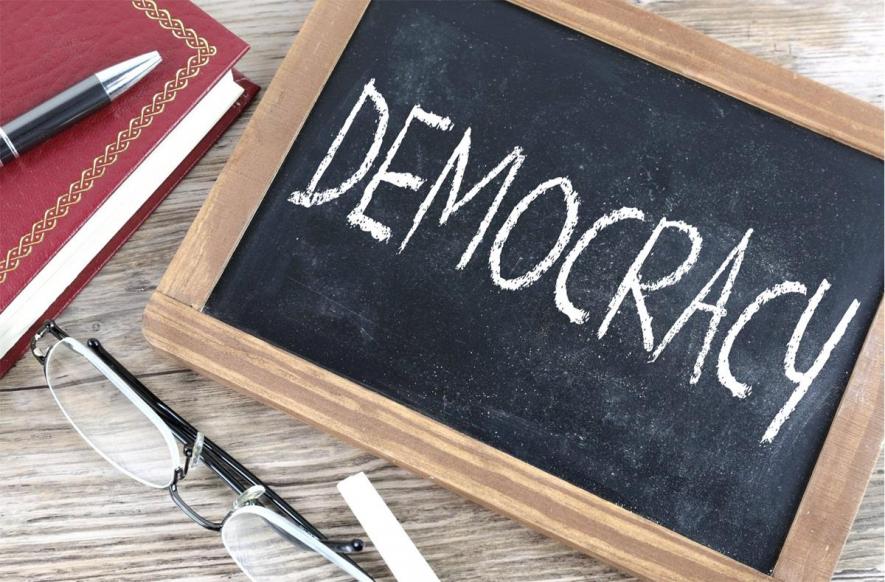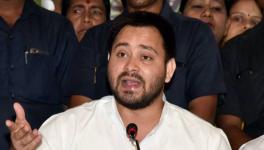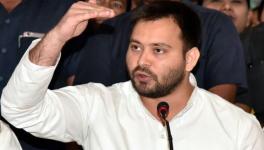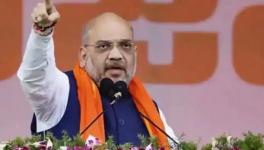Road Ahead to Save India’s Democracy

Image Courtesy: Picpedia
Prime Minister (PM) Narendra Modi uttered the word ‘democracy’ 14 times in his address to the joint session of the US Congress last Thursday. He tried to convince the lawmakers that there is no threat to democracy in India as alleged. “Democracy is one of our sacred and shared values,” he said while trying to convey that adherence to democratic norms is a civilisational commitment rather than an attribute of any particular political party.
Ironically, the government has systematically attacked the core institutions of democracy since Modi first came to power in 2014, especially after the 2019 re-election.
The Modi regime has undermined the independent image of the Election Commission of India, manipulated courts to rule in its favour, used the Directorate of Enforcement (ED) against dissidents, opposition leaders and the press, and has increased its control of mainstream media.
Several instances show how democracy is under erosion. Lok Sabha Opposition leader and Wayanad MP Rahul Gandhi was sentenced to two years by a Gujarat court for taking a jibe at Modi and was immediately disqualified from the House.
One of Modi’s billionaire associates took over an independent television channel. An official panel was authorised to remove social media posts critical of the government. The ED and the Income Tax (I-T) Department raided the offices of several news portals. The ED, I-T Department and the National Investigation Agency have registered cases and issued summons or notices to media houses and journalists critical of Modi, at least 44 times, since 2018.
Undoubtedly, the attack on democracy is an ideological project of the RSS—a hardline Hindu nationalist organisation with which Modi has been associated since his youth—being executed by the BJP.
Media and the judiciary, the main pillars of democracy in the country, are collapsing one by one. These attacks on democracy have become the cause of national and international indignation.
During Modi’s America visit, hundreds of people protested and questioned his anti-democratic policies in front of the White House, where President Joe Biden hosted him.
“I have done investigative journalism for 25 years. But my career ended when I wrote an article on Judge BH Loya’s ‘murder’. I was sacked under pressure from the authorities. This is the media’s condition in India” investigative journalist Niranjan Takle said during the protest.
During a joint Modi-Biden presser at the White House, The Wall Street Journal journalist Sabrina Siddique asked Modi, “There are many human rights groups who say your government has discriminated against religious minorities and sought to silence its critics … What steps are you and your government willing to take to improve the rights of Muslims and other minorities in your country and uphold free speech?”
Modi replied, “In India’s democratic values, there is absolutely no discrimination, neither on the basis of caste, creed or age or any kind of geographic location … Democracy is our spirit. Democracy runs in our veins.”
The question sparked uproar on social media with Siddique being trolled by Modi supporters.
To understand the crisis in Indian democracy, one must understand the BJP’s roots in the RSS. It is an organisation working for the cause of a “Hindu Rashtra” since the freedom movement. Unlike the Congress and other parties that fought for independence and believed in a secular liberal democracy, the RSS advocated a “Hindu Rashtra” with Hindutva ideology.
In 1939, RSS chief MS Golwalkar published a book titled We, and Our Nationhood Defined, which codified in particularly eloquent terms the view that “the foreign races in Hindustan, especially the Muslims ... must merge into the Hindu race and do not claim their separate existence based on religion or they may remain in the country as a whole under the Hindu Rashtra. They shall not claim anything and would not be entitled to any privilege. They shall not be given any preference or entitled to equal civil rights as Hindus.”
In another chapter, Golwalkar cites the persecution of Jews by the Nazis as a model.
In 2002, when Modi was Gujarat’s chief minister, a train carrying Hindu pilgrims caught fire in the state’s Muslim-majority Godhra killing 59 people. The incident, blamed on Muslims, sparked large-scale communal riots with Hindu mobs massacring Muslims. An inquiry concluded that the fire was an accident.
According to human rights groups, about 1,000 people were killed in this massacre. The brutality was chilling. Amnesty International reported that 250-330 Muslim girls and women were raped and subjected to violent attacks and torture with most killed by the mobs.
During a press conference in Ahmedabad on April 4, 2002, then-PM Atal Behari Vajpayee, with Modi seated next to him, said, “For the chief minister, I have only one message—that he should follow Rajdharma.”
Modi allegedly did not intervene to stop the riots with the police remaining a mute spectator as Hindu mobs rampaged in Muslim-majority areas. Modi’s image was so tarnished by the riots that the US, which welcomed Modi last week, denied him a visa in 2005 on the grounds of “severe violations of religious freedom”. The ban was lifted in 2014 when Modi was elected PM.
Hyper-nationalism of BJP and RSS
The BJP and RSS agenda of hyper-nationalism has created an atmosphere of hate. Nationalism, as defined by complete lack of reasonable engagement, is detrimental to society and Constitution’s ethos. The aggressive dependence on religion demonstrates the BJP’s abject failure to address the pressing inflation and employment problems.
Modi government’s agenda
An analysis of the last nine years of Modi rule shows that the PM and RSS worked on two agendas. First, using the powers of the Prime Minister’s Office to spread the Hindutva ideology and polarise the electorate communally. Second, the concentration of power in one hand to weaken the judiciary, inquiry commissions, the press and the Opposition parties, and discredit public discontent.
The Hindutva narrative is essential to the party’s electoral success since Modi took office. Modi and state-level BJP leaders have consistently emphasised Hindutva themes in their speeches, and pursued policies that undermine Muslim rights and stoke Hindu anxieties about Muslims. It is widespread mainly in Hindi states and to some extent in the West Bengal.
Targeting of Opposition, dissent
After concentrating power in its hands and touting the success of its “double engine government”, the Modi government let the ED and the Central Bureau of Investigation loose behind opposition parties and their leaders to undermine democracy.
According to an analysis, 95% of ED/CBI cases/raids are against opposition parties. Those agitating against the Modi government policies were jailed. The biggest example was the suppression of the Citizenship Amendment Act with false cases slapped on agitators—student leader Umar Khalid has been in jail for more than 1,000 days.
Undoubtedly, Modi’s hard-line agenda seeks to advance the politics of Hindutva at the expense of Muslims and other minorities. The PM has always pointed out that he is only the leader of the majority. Therefore, Hindu rituals are part of every inauguration or foundation stone ceremony. Modi claims that he and his government are honouring India’s historical position as the “mother of democracy”.
Can democracy be saved?
This is not the first time that democracy has come under threat. In June 1975, then-PM Indira Gandhi declared Emergency, suspending the opposition's and the public's basic rights and freedom. The decision cost her dearly two years later when the Congress was defeated by the Janata Party in 1977.
Today, India is under an undeclared emergency which has ideological support in society. Elections are converted into either a Hindu-Muslim or India-Pakistan debate, especially in the Hindi heartland, where Hindutva politics has a vast influence—Uttar Pradesh, Madhya Pradesh, Rajasthan, Gujarat, Chhattisgarh, Delhi and Haryana.
All is Not Lost Yet
The Karnataka elections have proved that the BJP can be defeated and democracy can be strengthened. Even at the national level, opposition parties still can get their message across.
Between September 2022 and January 2023, the Bharat Jodo Yatra had created uneasiness in the BJP camp and its first impact was seen in the Himachal Pradesh and Karnataka elections. BJP was almost defeated in Tripura as well, but Tipra-Motha vote division benefited the party. But it has suffered a big loss in terms of seats in Tripura. The Congress is brimming with enthusiasm and confidence in election-bound Madhya Pradesh, Rajasthan and Chhattisgarh—and this is a matter of concern for the BJP.
Economic issues
In the last nine years, the economy has declined. There is resentment among the general public due to inflation and unemployment. Farmers are agitated with the government for not paying MSPs for many crops. Public money is being allegedly transferred to big corporate entities in the name of increasing employment in the private sector.
Opposition parties are trying to forge a robust unity to take on the BJP in the 2024 Lok Sabha election. Recently, 16 parties met in Patna at the initiative of JD(U) leader and Bihar chief minister Nitish Kumar to unitedly challenge the BJP next year.
Role of Regional Parties
Regional parties can play a vital role in defeating the BJP. If the Congress wants to win elections in the states mentioned above, it has to give enough space to the regional parties.
In bigger states like UP, Bihar, Maharashtra, Tamil Nadu and Telangana, regional parties are at the forefront of the fight against the BJP. Therefore, the Congress must allow regional parties to lead the Opposition unity in their respective states.
If regional parties are respected and their political strength is ensured, the Opposition will become a sure contender for power in 2024 general elections.
Get the latest reports & analysis with people's perspective on Protests, movements & deep analytical videos, discussions of the current affairs in your Telegram app. Subscribe to NewsClick's Telegram channel & get Real-Time updates on stories, as they get published on our website.























